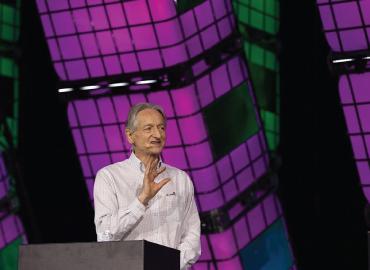
Geoffrey Hinton Wins Nobel Prize in Physics for AI Innovations
In a remarkable achievement that resonates through the realms of science and technology, Geoffrey Hinton, a University Professor Emeritus at the University of Toronto, has been awarded the 2024 Nobel Prize in Physics. Widely acknowledged as the "godfather of AI," Hinton shares this prestigious honor with Princeton University's John J. Hopfield. The duo has made significant foundational contributions to the field of machine learning, particularly through their pioneering work with artificial neural networks.
Hinton’s reaction to this momentous news was one of sheer astonishment. In a statement to U of T News shortly after the announcement in Stockholm, he confessed to being “flabbergasted” and that he had not anticipated such an accolade. “I am extremely surprised, and I’m honored to be included,” he said. Interestingly, Hinton received the news while staying in a modest hotel in California, where he found himself disconnected from the Internet and grappling with a poor phone connection. The day he learned of his Nobel Prize was meant to be routine, as he was scheduled for an MRI scan, which he humorously noted he would now have to cancel.
The work of Hinton and Hopfield utilizes tools from physics to push the boundaries of research in machine learning. Hopfield's innovative creation of associative memory allows for the storage and reconstruction of images, while Hinton’s groundbreaking methods enable data to be analyzed for specific properties and tasks, such as image recognition. At the core of Hinton's research is the Boltzmann machine, an advanced network built upon the principles of Hopfield's associative memory. This machine not only classifies images but can also generate new examples based on the training it has received, paving the way for advancements in deep learning technologies.
Also Read:- CFA Level 1 Results for August 2024 Announced: Check Your Status Now!
- Melania Trump Reveals Surprising Connection with King Charles
Ellen Moons, chair of the Nobel Committee for Physics, praised the laureates for their invaluable contributions, emphasizing how artificial neural networks are now employed across various scientific domains. She noted their critical role in developing new materials with tailored properties, highlighting the broad applicability and significance of their work.
Hinton's journey at the University of Toronto began in 1987 after an academic career in the UK and the United States. He achieved the esteemed title of University Professor in 2006. Over the years, he has become a leading figure in the AI landscape, fostering innovation that has placed Canada at the forefront of artificial intelligence development. His research has driven the rapid evolution of technologies we see today, from large language models like ChatGPT to the advancement of self-driving cars.
In a virtual press conference with the Royal Swedish Academy of Sciences, Hinton drew parallels between the rise of AI and the transformative effects of the Industrial Revolution. “But instead of exceeding people in physical strength, it’s going to exceed people in intellectual ability,” he noted. While he is optimistic about AI's potential benefits in healthcare and workplace productivity, Hinton also emphasized the importance of addressing the associated risks. He has repeatedly voiced concerns about the potential consequences of unchecked AI development, advocating for a balanced approach to innovation.
Hinton's extensive list of accolades includes the prestigious A.M. Turing Award, often regarded as the Nobel Prize of computing, and memberships in esteemed scientific institutions such as the U.S. National Academy of Sciences. His latest honor adds to the legacy of the University of Toronto, which has produced several Nobel laureates in various fields. Hinton's profound impact on deep learning and neural networks not only solidifies his status as a visionary in AI but also underscores the necessity for responsible and ethical technology development.
As we celebrate Geoffrey Hinton’s groundbreaking contributions to science and technology, we are reminded of the profound impact that dedicated research and innovation can have on society. The future of AI is bright, and with leaders like Hinton at the forefront, we can anticipate a new era of technological advancement that benefits humanity while carefully navigating its complexities.
Read More:

0 Comments